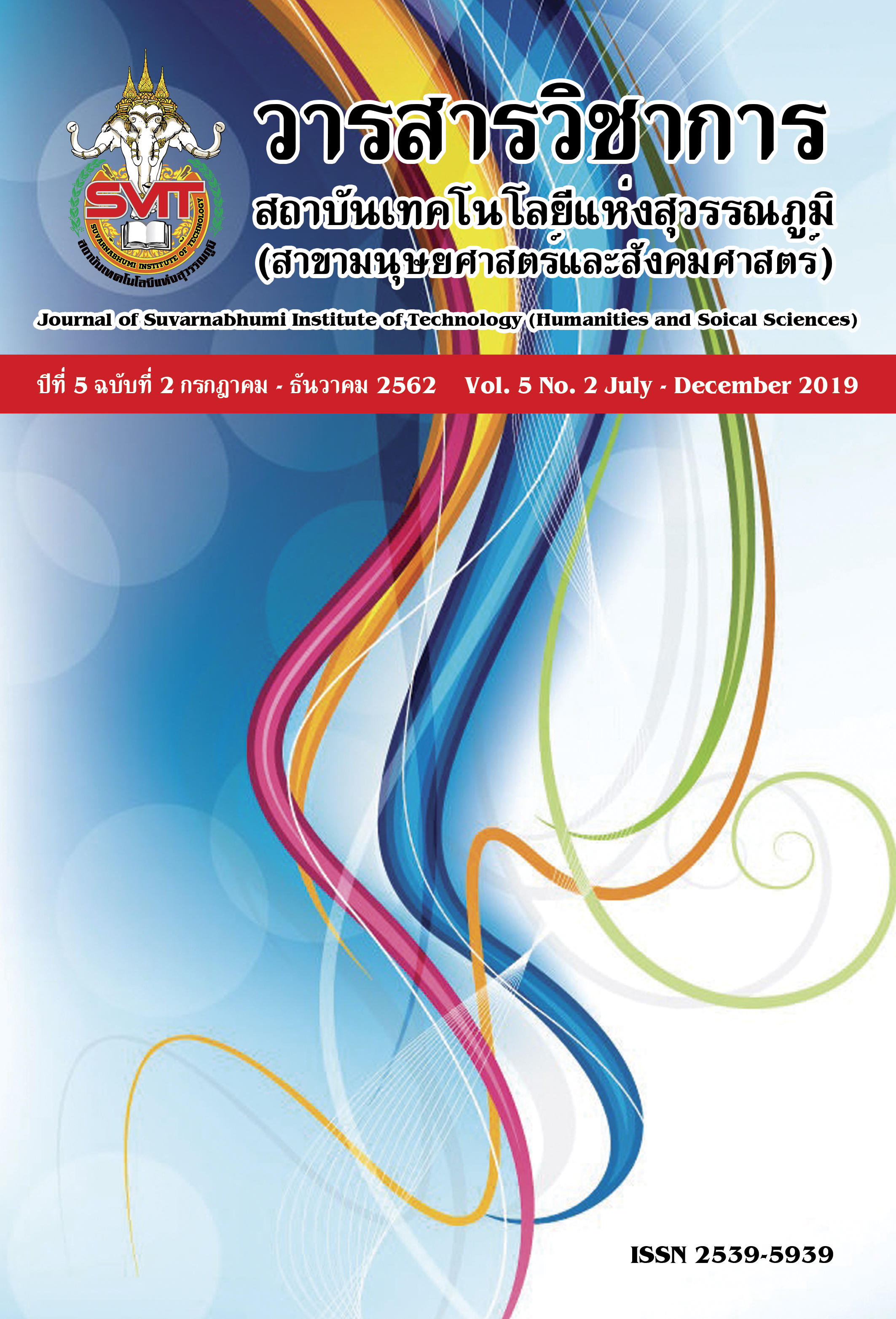STRENGTHENING COMMUNITY AND SOCIAL ALONG WITH SUFFICIENCY ECONOMY PHILOSOPHY AND QUALITY OF LIFE DEVELOPMENT OF ELDERLY IN KHAOPHRANGAM SUB DISTRICT MUNICIPALITY, AMPHUR MUEANG, LOPBURI PROVINCE
Keywords:
Strengthening, Sufficiency economy Philosophy, elderly’s quality of lifeAbstract
This research was to study the strengthening level of community and social along with sufficiency economy philosophy, quality of life, strengthening community and social along with sufficiency economy philosophy effecting elderly’s life quality in Khaophranham Sub District Municipality, Lopburi Province. This research also covered the improvement and analysis on the result of the prototype housing project (help and support chronic illness people and elders), and the project of the full-service center for developing elderly’s quality of life. The quantitative groups were comprised of 355 elderly and qualitative were 20 elderly also, the related people, who involve in this project are around 20 people. The tools using for this research were questionnaires, indepth interview and focus group.
The research results were found that;
- The factors on the strengthening community and social such as strengthening community, promotion policy, promotion of participation, community integration, community learning support from outside agencies effecting the improvement of elderly’s life quality.
-
The implementation of the “prototype housing” health project for chronic illness people and elderly people created the networking service, promoted the contribution of local society and between their elder relatives. The patients obtained attention on their health at home as they were in hospital also, the service was accessed automatically via calling for every household of patients.
-
The implementation of full service development centre for elders caused to the initiation of “Patchimwai Wittaya”school, exhibition room and activity room for elders.
References
กุหลาบ รัตนสัจธรรม และคณะ. (2535). การพัฒนารูปแบบที่เหมาะสมในวิธีดำเนินงานวางแผนพัฒนาคุณภาพชีวิต ตามเกณฑ์ความจำเป็นพื้นฐานในระดับหมู่บ้าน. กรุงเทพฯ : กรมสุขภาพจิต.
โกวิทย์ พวงงาม. (2553). การจัดการตนเองของชุมชน. กรุงเทพฯ : เอกเปอเน็ต.
คณะกรรมการพัฒนาเศรษฐกิจและสังคมแห่งชาติ(2555). แผนพัฒนาเศรษฐกิจและสังคมแห่งชาติ ฉบับที่ 11 (พ.ศ.2555 – 2559). กรุงเทพฯ : ผู้แต่ง.
เฉลียว บุรีภักดี. (2552). สัมมนาการวิจัยยุทธศาสตร์การพัฒนาในรูปแบบต่าง ๆ . เพชรบุรี : มหาวิทยาลัยราชภัฏ เพชรบุรี.
ดุจฤดี คงสุวรรณ์และวรรณะ รัตนพงษ์. (2554). ประชากรและสังคมโลก. คณะสังคมศาสตร์ มหาวิทยาลัยราชภัฏเชียงราย. (ระบบออนไลน์) จากแหล่งข้อมูลhttps://www.baanjomyut.com/global_community/02_2.html (1ตุลาคม 2560 )
เทศบาลตำบลเขาพระงาม. (2559). เอกสารประกอบการให้ความรู้เบื้องต้นเกี่ยวกับ รางวัล UNPSA. ลพบุรี : ผู้แต่ง.
ป๋วย อึ๊งภากรณ์. (2530). ปฏิทินแห่งความหลังจากครรภ์มารดาถึงเชิงตะกอนในศาสนธรรมกับกาลเวลา. กรุงเทพฯ : มูลนิธีโกมลคีมทอง. หน้า 135-138.
พระเทพเวที (ประยุทธ์ ปยุตโต). (2553). คุณภาพชีวิตตามนัยแห่งพุทธรรม. ในสังคมวิทยาละมนุษยวิทยา.กรุงเทพฯ : มหาวิทยาลัยธรรมศาสตร์. หน้า 1-6.
พิชิต พิทักษ์เทพสมบัติ และคณะ. (2553). ความสุขของคนไทยในเขตชนบท. กรุงเทพฯ : สถาบันบัณฑิตพัฒนบริหารศาสตร์.
วรเดช จันทศร. (2532). การบริหารเพื่อการพัฒนากระทรวงสาธารณสุข. กรุงเทพฯ : มูลนิธิสถาบันเพื่อ การพัฒนาประเทศไทย.
สุพรรณี ไชยอำพร และสนิท สมัครการ. (2535). การวิเคราะห์ทางสังคมเพื่อการพัฒนา. กรุงเทพฯ : มหาวิทยาลัยธรรมศาสตร์.
เสรี พงค์พิศ. (2548) ชุมชนเรียนรู้อยู่เย็นเป็นสุข. กรุงเทพฯ : พลังปัญญา.
Blumel, C.M. (2001). Foreiqn Aid. Donor Coordination (Kenya). Ph.D. Dissertation University of Maryland
ESCAP. (1990). Guideline On Methodological Approaches to The Conduct of a Regional Survey of The Quality of Life as an Aspects of Human Resources Development. New York : ESCAP.
Hfocus เจาะลึกระบบสุขภาพ. (ระบบออนไลน์) แหล่งข้อมูล https://hfocus.org/content/2015/04/9734 (31 ตุลาคม 2561).
Orley and Kuyken, W. (1995). Quality of life assessment : International perspectives. New York : Springer-verleg.
Downloads
Published
Issue
Section
License
The articles published are copyrighted by the Sarasas Journal of Humanities and Social Science. The opinions expressed in each article in this academic journal are those of the individual authors and do not reflect the views of Sarasas Suvarnabhumi Institute of Technology. The authors are solely responsible for all aspects of their respective articles. Any errors or inaccuracies in the articles are the sole responsibility of the authors.



